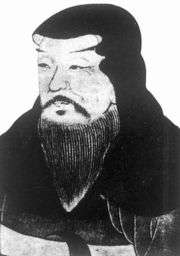Xu Shen

Xǔ Shèn (traditional Chinese: 許慎; simplified Chinese: 许慎; pinyin: Xǔ Shèn; Wade–Giles: Hsü Shen; c. 58 – c. 147 CE) was a Chinese philologist of the Han Dynasty. He was the author of Shuowen Jiezi,[1][2] the first Chinese dictionary with character analysis, as well as the first to organize the characters by shared components. It contains over 9,000 character entries under 540 radicals, explaining the origins of the characters based primarily upon a study of the earlier (roughly late third century BCE) Small Seal Script.[3] A number of Xu Shen's character analyses are erroneous, as the seal script differs considerably from the older bronzeware script and the even older oracle bone script, both of which were unknown at the time, also to Xu Shen.[3] Xu Shen completed his dictionary in 100 CE[4] but, for political reasons, waited until 121 CE before having the work presented to the Emperor An of Han China by his son.
A native of the present-day Yancheng District (郾城) City of Luohe (漯河) in Henan Province, Xu Shen was a renowned Confucianist scholar who specialized in the Five Classics, and wrote the Wujing yiyi (五經異義 "Differing Meanings in the Five Classics").[1] Although the original text was partially lost or corrupted by the Tang Dynasty, the Qing Dynasty scholar Chen Shouqi (陳壽棋; 1771–1834) partially reconstructed the work from fragments and quotations.
See also
References
- 1 2 Daijisen entry "Xu Shen" (Kyo Shin in Japanese). Shogakukan.
- ↑ Kanjigen entry "Xu Shen" (Kyo Shin in Japanese). Gakken, 2006.
- 1 2 Paragraph 70 in Victor H. Mair "Language and Script", chapter 1 in Mair 2001.
- ↑ Paragraph 68 in Victor H. Mair "Language and Script", chapter 1 in Mair 2001.
Cited works
- Mair, Victor H. (ed.) (2001). The Columbia History of Chinese Literature. New York: Columbia University Press. ISBN 0-231-10984-9. (Amazon Kindle edition.)
Further reading
- He Jiuying 何九盈 (1995). Zhongguo gudai yuyanxue shi (中囯古代语言学史 "A history of ancient Chinese linguistics"). Guangzhou: Guangdong jiaoyu chubanshe.